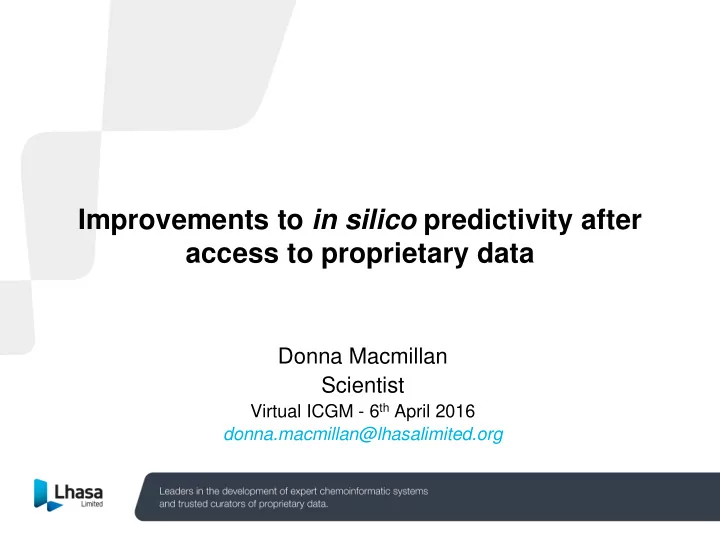

Improvements to in silico predictivity after access to proprietary data Donna Macmillan Scientist Virtual ICGM - 6 th April 2016 donna.macmillan@lhasalimited.org
Agenda (1) Why data sharing is important and how data is used (2) Case study using Ames data (mutagenicity) (3) Case study using LLNA data (skin sensitisation) (4) Conclusions (5) Questions
Why is data sharing important? • Encourages collaboration which benefits the scientific community • Gaps in the chemical space covered by in silico models can exist • Derek Nexus alerts are built mainly on public data • By donating proprietary data, these gaps can be filled • Model chemical space unique to each member • Can improve predictivity in the chemical space most important to members • Generalise models for mutual benefit
How do we use member data? • Check that the data is complete • Curated if required • Analyse the data • Whole data set • False negatives (FN) • False positives (FP) • Analysis usually carried out using cluster analysis • By-eye analysis may be easier for smaller data sets • Create new alerts and/or alert modifications • Implemented into Derek Nexus if public data/mechanistic rationale supports alert
A case study…mutagenicity
Member data curation and output Data sharing Curation Derek Analysis Output 5 new alerts 1261 4 existing alert proprietary modifications compounds anonymise clustering/ data by-eye 3 new aromatic 709 aromatic amine alerts amines
Mutagenicity in Derek Nexus • 122 mutagenicity alerts • 25% of alerts contain proprietary data • Comprehensive coverage of endpoint • Aromatic amines and boronic acids require refinement • Derek Nexus performance against public aromatic amine data is very good Mutagenicity Metrics (%) Results Data set Se Sp PP NP Acc TP FP TN FN Total Public 83 75 79 79 79 2908 762 2247 595 6512 Member 52 88 60 84 79 94 63 464 88 709
Chemical space coverage
Results - Member data - Mutagenicity
Results - Public data - Mutagenicity
A case study…skin sensitisation
Member data curation and output Data sharing Curation Derek Analysis Output 6 new alerts 467 proprietary 5 alert compounds anonymise clustering/ modifications data by-eye
Skin sensitisation in Derek Nexus • 88 skin sensitisation alerts • Good coverage • Ongoing KB development work on this endpoint • Using proprietary data assists in making these improvements more relevant to member chemical space • Performance against public data is good Skin Metrics (%) Results Data set Se Sp PP NP Acc TP FP TN FN Total Public 77 70 73 76 74 1020 382 910 296 2611 Member 44 79 40 82 71 49 74 282 62 467
Chemical space and alert coverage
Results - Member data - Skin sensitisation
Results - Public data - Skin sensitisation
Data sharing summary • Data sharing greatly improves predictivity of member data • In particular, sensitivity can be improved without adversely affecting specificity • Public data set predictivity is also improved • Increased chemical space coverage useful to all members
Conclusions • Successful data sharing has led to improvements in mutagenicity/skin sensitisation chemical space coverage • Predictivity of (large) public data sets improved by a few percentage points • Major improvements in predictivity of proprietary data • 14% and 22% increase in Se and 7% and 7% increase in PP for mutagenicity and skin sensitisation, respectively • Benefits both Lhasa and all members • 20 alerts/alert modifications being implemented into Derek Nexus from the two member data sets shown • Released 2016/2017
Conclusions • Collaborative publication in the pipeline • Joint posters presented at SOT 2016 • The success of the data sharing project has led to other data sharing initiatives being organised with the member discussed and other members If any members are interested in discussing a data sharing opportunity please contact our Business Development Director liz.covey-crump@lhasalimited.org
Acknowledgements • Steven Canipa • Richard Williams • Everyone at Lhasa Limited • The member who donated data
Thank you for listening Questions?
Recommend
More recommend